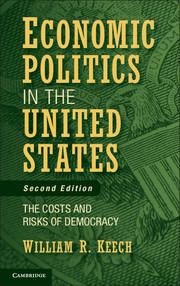Book contents
- Frontmatter
- Contents
- List of Figures and Tables
- Preface to the Second Edition
- Preface to the First Edition
- Part One Introduction
- Part Two Models of Macroeconomic Politics in a Democracy
- Part Three The Sources and Authority of Macroeconomic Goals
- 6 The Authority of Macroeconomic Goals
- 7 Voters, Elections, Accountability, and Choice
- Part Four Institutions and Processes
- Part Five Conclusion
- References
- Index
- References
6 - The Authority of Macroeconomic Goals
Published online by Cambridge University Press: 05 June 2014
- Frontmatter
- Contents
- List of Figures and Tables
- Preface to the Second Edition
- Preface to the First Edition
- Part One Introduction
- Part Two Models of Macroeconomic Politics in a Democracy
- Part Three The Sources and Authority of Macroeconomic Goals
- 6 The Authority of Macroeconomic Goals
- 7 Voters, Elections, Accountability, and Choice
- Part Four Institutions and Processes
- Part Five Conclusion
- References
- Index
- References
Summary
In Chapters 3 and 4, dealing with models of routine politics, we treated parties and voters as oriented to identifiable goals regarding inflation, unemployment, and income growth. We drew on the familiar misery index and showed how it could be modified to represent different preferences, and even to represent a conception of social welfare or the public interest. In doing so, we accepted goals and preferences as given, as predetermined, and as clearly defined. In this chapter and the next, we step back and ask where goals and preferences come from and how well defined and authoritative they are. In this chapter, we consider official public definitions of national economic goals, as well as what economists say about various targets of macroeconomic policy.
These chapters present the argument that there is no basis for an unambiguous or uncontestable definition of the public interest, and no basis for an authoritative welfare function. This argument undermines assertions that democracy has costs and pathologies. Without authoritative definitions of what public policy ought to be, we have no solid basis for comparing the outcomes of democratic politics to the best or most appropriate outcomes. It is difficult to argue that democratic political processes lead systematically to inferior outcomes when superior outcomes resist precise and authoritative definition. In fact, the goals of public policy are defined and redefined in a continuing and fluid political process.
- Type
- Chapter
- Information
- Economic Politics in the United StatesThe Costs and Risks of Democracy, pp. 129 - 154Publisher: Cambridge University PressPrint publication year: 2013



